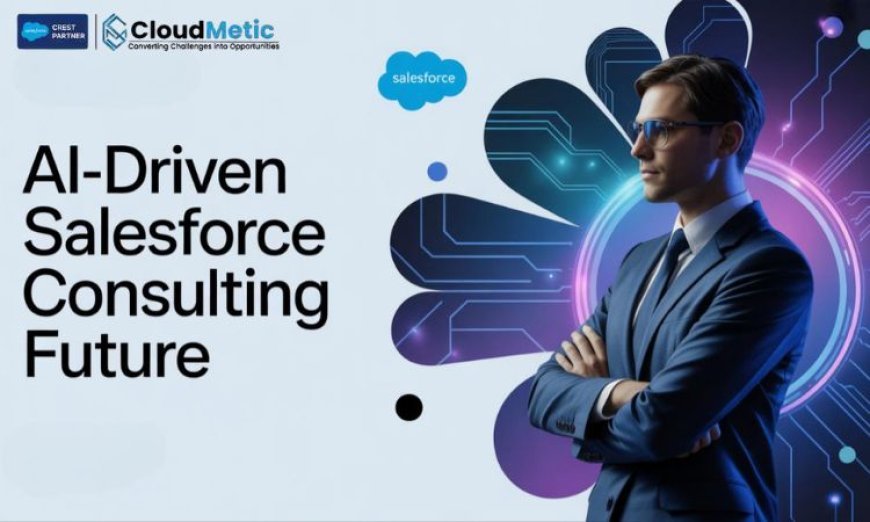The Evolving Role of a Salesforce Consultant in the AI-Driven CRM Era

In an era where CRM systems are infused with AI and automation, businesses face a rapidly changing landscape. Advanced tools like predictive analytics and intelligent automation are reshaping how companies manage customer interactions and data. This transformation places a strategic spotlight on the Salesforce consultant, whose role is evolving from a technical implementer to a strategic advisor. In this blog, we'll explore how Salesforce consultants are adapting to the AI-driven CRM era and what it means for organizations and professionals alike.
For context, Salesforce’s research finds 86% of business leaders expect AI to be a key driver of success by 2025. In the AI-driven CRM landscape, Salesforce consultants act as liaisons between business strategy and technology, working with sales, marketing, and IT teams to align Salesforce features with company goals. Damco Solutions notes these consultants are "far more than technical implementers; [they] are enablers of business modernization" and are moving "beyond execution roles to become strategic advisors" in this new era. It’s no surprise that Salesforce reports over 272,000 partner consultants have earned AI certifications, and that Salesforce consulting partners have launched specialized services to navigate AI-driven transformations.
AI-Powered Features of Salesforce CRM
Salesforce’s platform now includes many built-in AI features that extend its CRM capabilities. For example, Salesforce offers tools such as:
- Salesforce Einstein – A suite of machine learning and natural language processing (NLP) tools that provides predictive analytics from your CRM data. Einstein can automatically score leads, forecast sales trends, and recommend actions to boost productivity.
- Einstein GPT & Copilot – Generative AI assistants embedded in Sales, Service, and Marketing Clouds that draft personalized content (like emails or answers) and automate routine tasks.
- Predictive Lead Scoring & Opportunity Insights – AI models that automatically prioritize high-value leads and sales opportunities based on past data and patterns.
- Service Cloud AI Bots – Virtual agents that handle common customer service inquiries using natural language, freeing up human agents for complex issues.
- Marketing Cloud AI – Tools for precision targeting, predictive journey planning, and personalized campaign recommendations.
- CRM Analytics (Tableau CRM) – Advanced dashboards and reporting with AI-driven insights for better business decision-making.
These AI-driven features help companies work smarter, but deploying them effectively often requires expert guidance.
Expanding Responsibilities of Salesforce Consultants
With AI at the center of CRM, Salesforce consultants are expanding beyond traditional tasks. Modern responsibilities now include:
- Aligning AI Strategy with Business Goals – Consultants work with leadership to map AI initiatives to key metrics (e.g. customer lifetime value or churn reduction).
- Customizing AI Solutions to Workflows – They tailor Einstein and other AI tools to fit each company’s unique processes, ensuring seamless integration with existing systems.
- Training Teams on AI Adoption – Consultants design training and change management programs so that sales, service, and marketing teams understand and embrace new AI features.
- Monitoring and Optimizing AI Performance – They set up dashboards and feedback loops to track AI effectiveness, continually refining models as needs change.
- Ensuring Data Security and Ethics – Consultants enforce AI governance policies, data encryption, and compliance measures so that AI-driven features remain secure and trustworthy.
By handling these tasks, the Salesforce consultant ensures that AI-powered CRM truly drives business value.
Skills of a Modern Salesforce Consultant
To fulfill these evolving duties, consultants need new skills and expertise:
- Prompt Engineering & AI Tuning – The ability to craft effective prompts for generative AI tools and fine-tune AI agents for accuracy and better results.
- Business Acumen – Translating company objectives into smart, AI-driven workflows and conversations.
- Cross-Functional Collaboration – Working closely with sales, service, IT, legal, and other teams to make sure AI solutions fit real-world processes and regulatory requirements.
- Data and Technical Proficiency – Strong skills in data analysis, Salesforce development, and integration (APIs, MuleSoft, etc.) are critical for configuring AI features and ensuring quality data feeds.
- Change Management & Communication – Guiding cultural shifts by explaining AI benefits, addressing concerns, and coaching users on the new tools (a skill seen in traditional consulting, now applied to AI as well).
In fact, thought leaders predict that formal roles like “Salesforce AI Consultant” will soon become common, reflecting the need for consultants who are both Salesforce experts and AI-savvy.
Collaborating with Salesforce Consulting Partners
For business owners, partnering with the right Salesforce consulting partners is crucial in this AI-driven era. Reputable partners bring deep expertise and the latest insights:
- Certified Expertise – Official Salesforce consulting partners have direct access to new products and training, and hold certifications in Sales Cloud, Einstein Analytics, Data Cloud, etc. They know best practices for implementation.
- AI-Focused Services – Many partners now offer specialized AI and Agentforce services. For example, Salesforce reports that partners have launched new services to help customers navigate agentic AI transformations.
- End-to-End Support – From strategy and design to training and optimization, these partners guide companies through each step of AI adoption, reducing risk and improving ROI.
By leveraging experienced Salesforce consulting partners with proven AI expertise, organizations can faster unlock the benefits of AI in their CRM.
Conclusion
The Salesforce consultant’s role is rapidly evolving in today’s AI-powered CRM landscape. No longer just system configurators, modern consultants must be strategic advisors who align AI tools with business objectives, govern data ethically, train teams, and continuously optimize solutions. For Salesforce professionals, this means building skills in AI concepts, analytics, and change management to remain indispensable. For business owners, it means choosing proven Salesforce consulting partners to guide the AI journey. As Salesforce itself reports, many partner consultants have already earned AI certifications and partners have introduced new AI-focused services to help clients succeed. Partnering with these experts is key to harnessing AI as a competitive advantage in CRM.
What's Your Reaction?



















































